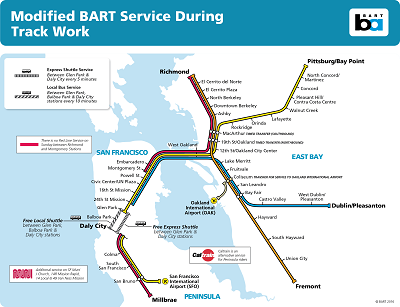UPDATE: July 29, 2016
There is a change being proposed to the Transportation Demand Management (TDM) Ordinance that will now - if passed - impact existing buildings who change the use of 25,000 sq. ft. or more of non-residential space and require the building owner to do an assessment on the traffic impacts the change will generate. The Planning Commission is set to hear it August 4, 2016.
Please email kenc@boma.com and johnb@boma.com with any feedback you may have.
About TDM
The Transportation Demand Management (TDM) Program is designed to work with developers to provide more on-site amenities that will encourage smarter travel options so people can get around more easily without a car. These choices are better for the environment, help manage congestion, help to reduce risks to pedestrians and cyclists, and improve the overall efficiency of our transportation network.
A series of development-focused TDM measures are intended to “shift” more typical car-dependent travel practices by providing reliable alternatives, such as:
Delivery services
Bicycle amenities
Subsidized transit passes
The TDM Program would apply to nearly all types of new development and changes of use. The end result: more sustainable transportation options for a building’s tenants, employees, residents, and visitors, which benefits not only the local neighborhood, but the City as a whole.
Frequently Asked Questions
--------------------
UPDATE - April 21, 2016
For decades, environmental analysis of transportation impacts focused on how quickly cars moved through a given intersection, a flawed approach that was expensive to calculate, did little to benefit the environment and promoted urban sprawl rather than smart infill growth. The new approach is more comprehensive, looking at the method of travel, how far the person is going, and how many other people are in the vehicle to determine the impact on the environment.
The resolution to take immediate action represents the Align component of the Transportation Sustainability Program, a three-part citywide policy initiative to help transportation keep pace with growth in the city.
More Updates
Introduction of Transportation Demand Management: SHIFT
On February 11, 2016, Planning Department staff provided a brief overview on the Transportation Sustainability Program’s SHIFT component, the proposed Transportation Demand Management (TDM) Ordinance. TDM describes strategies or measures that incentivize sustainable ways of getting around. These types of travel choices are good for the environment, help manage congestion and improve the efficiency of the transportation network. The City is working on shifting travel choices as San Francisco grows, making it easier for new arrivals to take transit, bike or other efficient travel methods rather than moving to the city with a car.
On April 28, 2016, Planning Department staff will initiate a Planning Code Amendment for the TDM Ordinance. In addition, the TDM project team will be presenting the Ordinance to various neighborhood Citizen Advisory Committees this spring. Please see below for a list of the upcoming meetings before the Ordinance will be introduced at the Board of Supervisors.
Visit our Shift page for the executive summary and a copy of the presentation that was provided at the February 11th Planning Commission hearing. We intend on updating this page soon with more information related to the TDM Ordinance, so please stay tuned.














